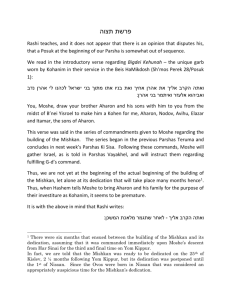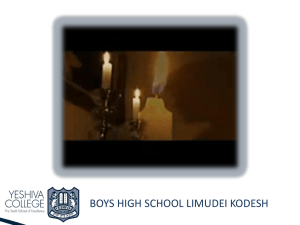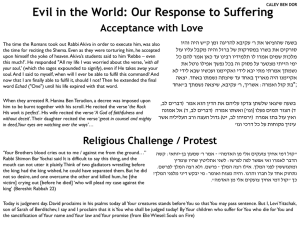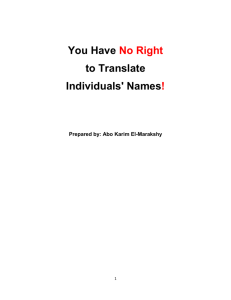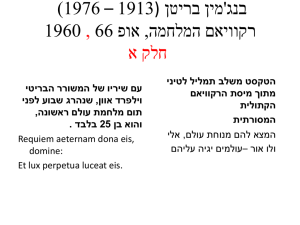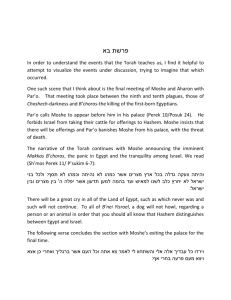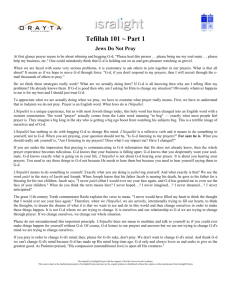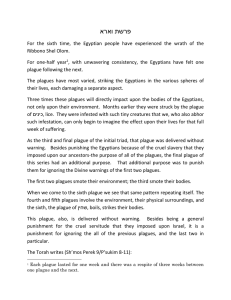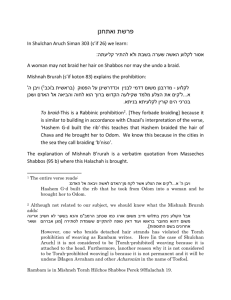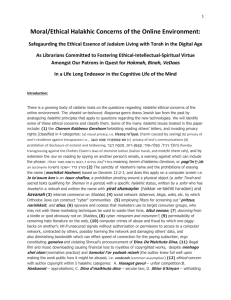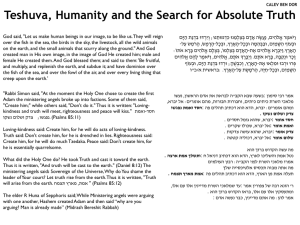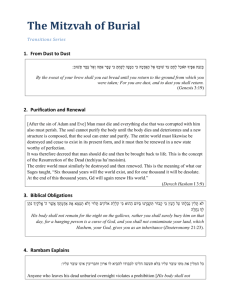Kin`ah - Machal
advertisement
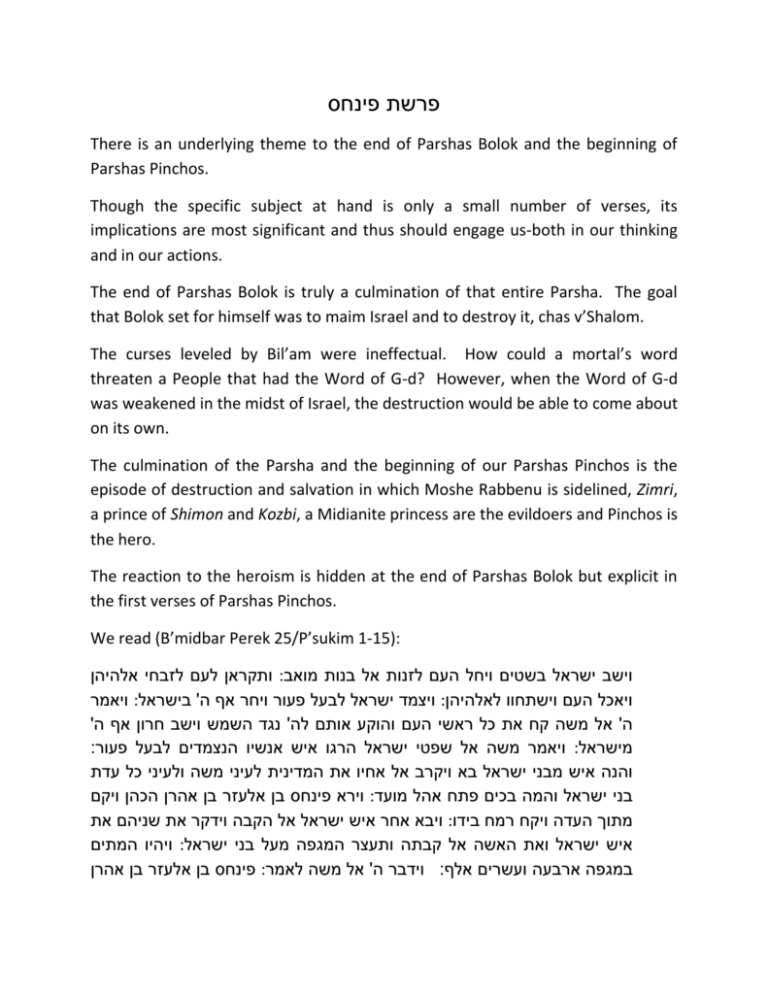
פרשת פינחס There is an underlying theme to the end of Parshas Bolok and the beginning of Parshas Pinchos. Though the specific subject at hand is only a small number of verses, its implications are most significant and thus should engage us-both in our thinking and in our actions. The end of Parshas Bolok is truly a culmination of that entire Parsha. The goal that Bolok set for himself was to maim Israel and to destroy it, chas v’Shalom. The curses leveled by Bil’am were ineffectual. How could a mortal’s word threaten a People that had the Word of G-d? However, when the Word of G-d was weakened in the midst of Israel, the destruction would be able to come about on its own. The culmination of the Parsha and the beginning of our Parshas Pinchos is the episode of destruction and salvation in which Moshe Rabbenu is sidelined, Zimri, a prince of Shimon and Kozbi, a Midianite princess are the evildoers and Pinchos is the hero. The reaction to the heroism is hidden at the end of Parshas Bolok but explicit in the first verses of Parshas Pinchos. We read (B’midbar Perek 25/P’sukim 1-15): ותקראן לעם לזבחי אלהיהן:וישב ישראל בשטים ויחל העם לזנות אל בנות מואב ויאמר: ויצמד ישראל לבעל פעור ויחר אף ה' בישראל:ויאכל העם וישתחוו לאלהיהן 'ה' אל משה קח את כל ראשי העם והוקע אותם לה' נגד השמש וישב חרון אף ה : ויאמר משה אל שפטי ישראל הרגו איש אנשיו הנצמדים לבעל פעור:מישראל והנה איש מבני ישראל בא ויקרב אל אחיו את המדינית לעיני משה ולעיני כל עדת וירא פינחס בן אלעזר בן אהרן הכהן ויקם:בני ישראל והמה בכים פתח אהל מועד ויבא אחר איש ישראל אל הקבה וידקר את שניהם את:מתוך העדה ויקח רמח בידו ויהיו המתים:איש ישראל ואת האשה אל קבתה ותעצר המגפה מעל בני ישראל פינחס בן אלעזר בן אהרן: וידבר ה' אל משה לאמר:במגפה ארבעה ועשרים אלף הכהן השיב את־חמתי מעל בני ישראל בקנאו את קנאתי בתוכם ולא כליתי את בני והיתה לו ולזרעו אחריו: לכן אמר הנני נתן לו את בריתי שלום:ישראל בקנאתי ושם איש ישראל:ל'קיו ויכפר על בני ישראל...ברית כהנת עולם תחת אשר קנא לא ושם האשה:המכה אשר הכה את המדינית זמרי בן סלוא נשיא בית אב לשמעני :המכה המדינית כזבי בת צור ראש אמות בית אב במדין הוא Yisroel dwelled in Shittim and the people began to stray1 to the daughters of Moav. [The daughters of Moav] called the people to the sacrifices of their gods and the people ate and they bowed to their gods. Yisroel became attached to Ba’al P’or and Hashem was angry at Israel. Hashem said to Moshe, ‘take the leaders of the people and hang2 the perpetrators before G-d clearly3 and G-d’s anger will retract from Israel. Moshe said to the judges of Israel, ‘each of you should kill his people4 who are attached to Ba’al P’or. Behold, a man from B’nei Yisroel came and he brought near his brethren the Midianite woman before the eyes of Moshe and before the eyes of all the congregation of B’nei Yisroel and they were crying at the לזנותliterally means to turn or to stray. This is the proper translation in this context in which the preposition is אל, to. They strayed to these women for immoral behavior. 1 In its Halachic sense, ‘hanging’ is far different than ‘hanging’ in non-Halachic sense. For the latter, ‘hanging’ is execution. A person dies by such a punishment. In the Halachic sense, ‘hanging’ is tying the body to a stake after the execution. 2 That is the clear meaning of the verse in Parshas Ki Setze (D’vorim Perek 21/Posuk 22):וכי יהיה באיש חטא משפט מות והומת ותלית אתו על־עץ. When a person commits a sin which has capital punishment and he is put to death, you shall hang him on wood. In Masseches Sanhedrin (45 b) there is a dispute if everyone who received the death penalty of sekila-stoning was hanged or only those who denied G-d. The verse says ‘opposite the sun’. This means that the judges will judge with clarity. This is an important idea which teaches that even though there was Divine wrath, the principles of justice were not suspended. 3 4 The commentators discuss if all or only most of those killed were from the tribe of Shimon. The fact that their judges were declaring their liability for the death penalty added to the sense of fairness that justice would be accomplished. openings of their tents. Pinchos ben Elazar ben Aharon the Kohen saw and he arose from the midst of the congregation and he took a spear in his hand. And he came after the Israelite man into the tent and he speared both of them in the stomach, the Israelite man and the woman into her stomach and the plague was stopped from Israel. The dead in the plague were 24,000. Hashem spoke to Moshe saying. Pinchos ben Elazar ben Aharon HaKohen retracted My anger from upon B’nei Yisroel when he was zealous for My zealousness among them and I did not destroy B’nei Yisroel. Therefore, say to him, Behold I Hashem am giving you My covenant of peace. He and his seed will have the covenant of the everlasting Kehuna because he was zealous for his G-d and he atoned for B’nei Yisroel. The name of the Israelite man who was smitten, who was smitten with the Midianite woman, was Zimri ben Solu, a prince of a household of Shimon. The name of the smitten Midianite woman is Kozbi bas Tzur, the head of nations of a household in Midian. Pinchos received extraordinary attention from HaKodosh Boruch Hu. It is difficult to find a parallel on an individual who performs a single act, albeit a singular one, about whom the Torah specifically reveals5 to us his reward for such an undertaking. It is true that Kolev was singled out for his bravery in the face of the 10 spies who wished to speak badly about Eretz Yisroel and to deter our ancestor’s entry into the Land. We read (B’midbar Perek 14/Posuk 24): ועבדי כלב עקב היתה רוח אחרת עמו וימלא אחרי והביאתיו אל הארץ אשר בא :שמה וזרעו יורשנה Certainly there are manifold examples throughout Shas and Midrash in which our Chachamim present us with information regarding reward and punishment to individuals and nations. However, it is unique that the Torah writes the reward for an individual. 5 My servant Kolev-because there was a different spirit within him and he completely followed Me, I will bring him to the Land that he came there and his seed will inherit it. However, this is not at the level at which Pinchos was given Divine attention. Kolev did live and not die in the desert. We are not surprised that he was not killed with the evil spies-he was separate from them. Furthermore, he was not the only person not to perish in the desert, though he was over the age of 20 when he left Egypt. Yehoshua, of course, did not perish in the desert. The women did not perish in the desert because of the punishment. Furthermore, reprieve was granted to the last fifteen thousand people who were to have died in the fortieth year-and they, too, entered Eretz Yisroel. The fact that Kolev received a specific piece of Eretz Yisroel was special. However, he would have received some of Eretz Yisroel in any case-as did all those who entered the Land. Thus, it is not to detract from the specialness of Kolev that is the discussion. The uniqueness of that which was given to Pinchos still seems to be unmatched. The Torah points out the gift6 that was presented to him. Rashi understands that only one gift was given to Pinchos, that of ברית שלום. That covenant imparts an overall unique relationship with Hashem which is exemplified by ברית כהונת עולם, making Pinchos a ‘permanent’ Kohen as explained in the text. 6 However, others explain that בריתי שלום, My covenant of peace and ברית כהונת עולם, a covenant of everlasting Kehuna, are two separate rewards. Meshech Chochmoh elaborates: האחד שהרג ישראל בשביל נקמת, דפנחס עשה שני דברים, הענין.פנחס בן אלעזר בן אהרן , השני.' פוגעים בו- המקנאים לכבוד המקום והאומה- 'קנאים: וזה,כבוד ה' שלא יתחלל ב) "ויעמוד, וכמו שאמרו (סנהדרין פב,שהפקיר את כל העולם הבא וקנא לטובתם של ישראל על אלה ייהרגו כ"ד אלף מישראל?! ויעויין- ל) שעשה פלילות עם קונו,פנחס ויפלל" (תהלים קו שכן כשמת אהרן ונסתלקו העננים וחזרו, והנה הראשון מצאנו באלעזר. א,סנהדרין מד כדאמר ריש יומא, והרגו ישראל למען כבוד ישראל והקב"ה, ועמדו בני לוי ולחמו,לאחוריהם וזה. הרי בציוויו נעשה זה- " לב) "ונשיא נשיאי הלוי אלעזר בן אהרן, וכתוב (במדבר ג.בירושלמי , ג) שרצה להרחיקם עד יום מחר, ובאהרן אמרו רז"ל (ויקרא רבה י."שיחסו הכתוב "בן אלעזר הרי מפני תועליות ישראל השליך כל. ומוטב שיתלו הסרחון בי ואל יאבדו ישראל,עשה העגל ... והיתה לו ולזרעו אחריו ברית כהנת עולם:לכן אמר הנני נתן לו את בריתי שלום Therefore, say to him, Behold I Hashem am giving you My covenant of peace. He and his seed will have the covenant of the everlasting Kehuna… Rashi explains: "והיתה לו ולזרעו אחריו (ברית." לכן ייחסו הכתוב "בן אהרן.חלקו בעולם הבא לאהבת ישראל "ויכפר על- שהרג ישראל עבור כבוד הקדוש ברוך הוא- " תחת אשר קנא לאלקיו,)כהונת עולם . זה כפרת דברים שעשה פלילות עם קונו לתועליות האומה ולאהבתה- "בני ישראל Pinchos ben Elazar ben Aharon-The matter is thus. Pinchos did two things. First, he killed a Jew [Zimri] to avenge the honor of Hashem that it should not be profaned. This is the meaning of “Kano’im-those who are zealous for the honor of Hashem and of the People Israel, may assault etc. The second thing [that Pinchos did] was to be willing to forfeit his place in the world to come and to be zealous for the welfare of Israel and Chazal interpreted the verse “Pinchos stood and judged”. That is, he spoke accusatory towards Hashem and said, “for these [Zimri and Kozbi] 24,000 Israelites will be killed?” and see Masseches Sanhedrin 44 a. The first behavior we have already seen by Elazar (father of Pinchos) because when Aharon died and the ענני הכבוד, Clouds of Glory departed and Israel returned towards Egypt and B’nei Levi arose and fought them and killed Israelites for the honor of Israel and G-d-as it says in the beginning of Yerushalmi Masseches Yoma. And it is written, the head of the heads of the tribe of Levi was Elazar ben Aharon. Thus, it was with his command that this was done. Therefore, the Torah tells us that the father of Pinchos was Elazar. Regarding Aharon it says in the Midrash in reference to the Eigel, he wished to distance them until the morrow and made the Eigel and said, ‘better that I should be blamed and Israel should not be destroyed.’ Thus we see that for the benefit of Israel, Aharon was willing to cast away his portion of Olom HaBo for the love of Israel. Thus, the verse tells us that Pinchos was the grandson of Aharon. Pinchos received the everlasting covenant of Kehuna and he atoned for Israel by his words of accusation with his Master for the benefit of the people and his love for it. For the latter act he received בריתי שלום, My covenant of peace. כאדם המחזיק טובה וחנות למי שעושה, שתהא לו לברית שלום- את בריתי שלום : אף כאן פירש לו הקדוש ברוך הוא שלומותיו,עמו טובה My covenant of peace-This covenant will of peace for him. This is like a person who has gratitude and partiality for someone who did him a favor. Here, too, Hashem explains His ‘peace’ [with Pinchos]. לא נתנה אלא,ברית כהנת עולם – שאף על פי שכבר נתנה כהונה לזרעו של אהרן אבל פינחס, שנמשחו עמו ולתולדותיהם שיולידו אחר המשחתן,לאהרן ולבניו . לא בא לכלל כהונה עד כאן,שנולד קודם לכן ולא נמשח A covenant of the everlasting Kehuna-Even though the Kehuna was already given to the seed of Aharon, it was only given to Aharon and his sons, those who were anointed with him and their generations who would be born after their anointing. Pinchos was born already and he was not anointed and thus he was not a Kohen until this moment. This is a qualitatively different reward than that which accrued to Kolev. Kolev was recognized by Hashem. Kolev received a special nachalah-inheritance in Eretz Yisroel. He was not a changed person. Pinchos was a changed person. He became a Kohen. Not only was the Kehuna a reward to him personally but it became part of his personality and thus his children succeeded him as Kohanim, with all that is implicit in such a status. We may suggest that the change that accrued to Pinchos7 was qualitative, not quantitative. The publicity associated with this appointment of Pinchos is matched with the publicity given as to the reason for such an appointment. :ל'קיו ויכפר על בני ישראל...תחת אשר קנא לא... …because he was zealous for his G-d and he atoned for B’nei Yisroel. Certainly the changes that accrued to Moshe, when he became Moshe Rabbeinu, and Aharon, when he became a Kohen, were equally qualitative. However, our emphasis here is the explicitness by which the Torah tells us of the appointment of Pinchos. Such explicitness is unique here. 7 Pinchos was a קנאי, a zealot. That is the title that the Torah gives him. That is the accolade that would forever more accompany Pinchos throughout his life and for which he is a noted member of the Honor Roll of Jewish History. If one wishes to dilute the strength of the term ‘zealot’, Chazal will block such an attempt. Rashi cites the words of Chazal in Masseches Zevochim (101 b): .לא נתכהן פינחס עד שהרגו לזמרי Pinchos did not become a Kohen until he killed Zimri. Not only does the entire concept of zealotry require explanation, but the appointment of a Kohen because he killed someone would seem to be entirely counter-intuitive. The counter-intuitive nature of this appointment stems from at least two points. First, a ברית שלום, a covenant of peace would seem to be the opposite of killing. Secondly, there is a Halachah that states (Masseches B’rachos 32 b): )8טו/ שנאמר (איכה א, כל כהן שהרג את הנפש לא ישא את כפיו:אמר רבי יוחנן .ידיכם דמים מלאו Rabi Yochanan said, ‘any Kohen who kills a person may not ‘raise his hands’ [to bless Israel] as the verse says, ‘your hands were full with blood’. Rambam decides the Halachah according to this Gemara and adds an explanation. he writes (Hilchos Tefila Perek 15/Posuk 3): :כהן שהרג את הנפש אף על פי שעשה תשובה לא ישא את כפיו A Kohen who kills a person, even if he repented, may not ‘raise his hands’ to bless Israel. The entire verse reads: :ובפרשכם כפיכם אעלים עיני מכם גם כי־תרבו תפלה אינני שמע ידיכם דמים מלאו [Hashem said] ‘When you spread your hands I will hide My eyes from you; when you pray much, I do not listen, your hands are full with blood. ‘Spreading hands’ clear refers to Kohanim. 8 Shulchan Aruch (Orach Chaim Siman 128/s’if 35) also brings this Halachah with an opinion that seems more severe than that of Rambam9: :כהן שהרג את הנפש אפילו בשוגג לא ישא את כפיו אפילו עשה תשובה A Kohen who kills someone, even unintentionally, may not ‘raise his hands’, even if he repented. It would certainly seem to follow that if a bona fide Kohen would be disqualified from some of his functions because he killed, certainly such an act should block an individual from such an appointment. What is the nature of the heroism of ka’na’us, zealotry that led to this status of Pinchos? In Masseches Sanhedrin (81 b – 82 b) there is a lengthy discussion of why Pinchos was allowed to kill Zimri (and Kozbi) and associated significant points. The Mishna there (81 b) writes: . קנאין פוגעין בו- הבועל ארמית A Jewish man who has relationships with a non-Jewish woman-kanaimzealots may attack him. Rashi teaches:פוגעין – ממיתין. Attack-kill. The Gemara there (82 a) teaches: 9 However, see Rama to Shulchan Aruch here: שלא, ויש להקל על בעלי תשובה, ויש אומרים דאם עשה תשובה נושא כפיו:הגה : והכי נהוג,לנעול דלת בפניהם Rama-There are those who say that if he repented he is allowed to ‘raise his hands’. One should deal leniently with penitents in order not to ‘lock the door before them’ (and discourage repentance) and such is the practice. . אין מורין לו- הבא לימלך If [the zealot] comes to consult, we do not instruct him to do so [to kill the perpetrator]10. This Halachah seems to be contradicted by the very event that is used as its proof. 10 The Gemara (82 a) there writes about what occurred when Zimri brought Kozbi before Moshe Rabbenu: ראה: אמר רב- ? מה ראה, וירא פנחס בן אלעזר,כתיב... געו כולם בבכיה,נתעלמה ממנו הלכה הבועל את: לא כך לימדתני ברדתך מהר סיני, אחי אבי אבא: אמר לו. ונזכר הלכה,מעשה . קריינא דאיגרתא איהו ליהוי פרוונקא: אמר לו- !הנכרית קנאין פוגעין בו The Halachah was hidden from Moshe. They [those with Moshe Rabbenu] cried severely…It says ‘Pinchos ben Elazar saw’. What did he see? Rav said, ‘He saw the act [of Zimri and Kozbi] and remembered the Halachah [that Moshe forgot]. Pinchos said to Moshe Rabbenu, ‘My great-uncle [brother of my father’s father], did you not teach us when you came down from Sinai that one who has relations with a non-Jew –that zealots can kill him? Moshe said to Pinchos, he who reads the letter, shall be the one to carry out [its message]. Thus, it certainly appears that Moshe instructed Pinchos to undertake this act of zealotry and how then can the Gemara say that אין מורין כן-we do not instruct others to do so? The Ran here relates to this question and offers two answers. He writes: יש שואלין היאך אמר משה כך לפנחס שילך ויהרוג והא.קריינא דאגרתא איהו ליהוו פרוונקא והתשובה שמשה לא הורה לו ופנחס לא נמלך בו אלא שהוא.אמרינן שאם בא לימלך אין מורין לו הזכיר שמועתו בפני משה והוא השיב לו אם לעשות בו דין לא אמרת כלום ואם לקנא בו עד אי נמי שמשה רבינו לא ראה באותה.שאתה אומר לאחרים אמור לעצמך שאין לך ראוי ממך שעה להניח הדבר ברשות המקנאין אלא ראה לרמוז לו רמז על הדבר להוראת שעה בשביל :שתעצר המגפה מישראל The reader of the letter-he should fulfill its mission-there are those who ask, ‘how did Moshe tell Pinchos that he should do so and go and kill? Did we not say that one who consults-we do not instruct him to do so? The [first] answer is that Moshe did not instruct nor did Pinchos consult. All that Pinchos did was to mention the teaching of Moshe [to Moshe] and Moshe responded to that if Zimri should be tried in court-there is nothing to do. And if the intention of Pinchos was zealotry, -‘until you say it to others, say it to yourself because no one is more fit than you [to be a zealot]. A second answer is that Moshe Rabbenu did not see it fit in that particular circumstance to leave the matter as being dependent on the choice of the zealots. Rather, he saw fit to hint about the matter in an exceptional manner in order that the plague would be stopped from killing in Israel. The second answer that Ran offers agrees that this instance was exceptional and against the ‘rule’. However, Moshe, within his right, applied the Halachah of הוראת שעה, a one-time practice, because of the overriding danger to Israel of the catastrophic plague that immediately killed 24,000 Israelites. It should be noted that this question arose because of the explanation of Rav that Pinchos talked with Moshe and Moshe responded to him. However, the Gemara presents us with an opinion opposing that of Rav. כל מקום שיש חילול- 'ל) שאין חכמה ואין תבונה ואין עצה לנגד ה/ ראה (משלי כא:ושמואל אמר . אין חולקין כבוד לרב- השם Shmuel said, Pinchos saw that there is no wisdom and understanding or counsel with those who are against G-d. When there is an event of Chillul Hashem-profanation of the Divine Name, one does not give honor to the Rav (i.e. Moshe Rabbenu). Rashi explains: נזכר פסוק אין חכמה ואין תבונה נגד ה' שכל: כלומר- שמואל אמר מאי וירא ראה שאין חכמה ולא המתין, לפיכך הורה פנחס הלכה בפני רבו,מקום שיש חילול השם אין חולקין כבוד לרב . שלא יראו הרואים וילמדו להתיר את הנכרית,ליטול רשות ממשה Shmuel said, What does ‘he saw’ mean? That there is no wisdom…-This means to say that he remembered the verse that ‘there is no wisdom and understanding or counsel with those who are against G-d’. Wherever there is profanation of the Divine Name one does not give honor to the Rav. Thus, Pinchos decided the Halachah in the presence of his Rav [Moshe Rabbenu] and did not wait to receive permission from Moshe in order that the observers of the scene would see and rationalize to allow [marriage] with a non-Jewess. The reason for this is two-fold. First, the crime of הבועל ארמיתis not punishable by death in Beis Din. Thus, Beis Din cannot instruct an individual to do an act as their representative when they would not be allowed to do the act themselves11. Secondly, as Mishneh L’Melech points out in his commentary to Rambam (Hilchos Rotzeach Perek 1/Halachah 15) that the Halachah of הבועל ארמית קנאין פוגעין בוis not a requirement12; it is only an act that may be done if the kanai wishes to do so13. There is more to this law of הבועל ארמית קנאין פוגעין בוas well. שאם נהפך זמרי והרגו, ולא עוד אלא... אין מורין לו- הבא לימלך:אמר רבי יוחנן . שהרי רודף הוא, אין נהרג עליו- לפנחס Thus, according to Shmuel, Pinchos never consulted with Moshe and thus there is no question whatsoever. There is not necessarily tension between a crime that Beis Din is not authorized to judge and its severity. 11 The execution of a judgment by Beis Din can bring atonement and not everyone deserves such atonement. Such is the explanation given for certain cases where corporal punishments are not given-to prevent the atonement that results from those punishments. Thus, the words of Shaarei Teshuva of Rabbenu Yona (Shaar 3/131) regarding out case can be readily understood: , כי לא ימותו זולתי בעדים והתראה ועל פי סנהדרין,והדבר הזה חמור מכל חייבי מיתות בית דין .והחוטא הזה כל מוצאו יהרגהו בלא עדים והתראה This act [of ]הבועל ארמיתis more severe than all of those crimes for which there is a capital punishment administered by Beis Din. In the latter, they will not die without bona fide witnesses and warnings, and administered by Beis Din. This sinner-anyone who finds him kills him without witnesses and without warning. 12 A חובה. 13 A רשות. Rabi Yochanan said, ‘If [the zealot] consults with Beis Din, Beis Din does not instruct him to do the act…and not only that but if Zimri would have turned and killed Pinchos, Zimri would not have been killed [for killing Pinchos] because [Pinchos] was a rodef-pursuer14. Thus, we understand why there is no need to instruct one to pursue such an action when in fact he is endangering himself. If such liability would be the lot of anyone who wished to undertake an act of קנאין פוגעין בו, all the more so did it apply to Pinchos. Rashi comments as to the need for the Torah to tell us pedigree of Pinchos in our Parshas Pinchos. The lineage of Pinchos was noted earlier at the end of Parshas Bolok. Rashi writes: הראיתם בן פוטי, לפי שהיו השבטים מבזים אותו- פינחס בן אלעזר בן אהרן הכהן לפיכך בא,זה שפיטם אבי אמו עגלים לעבודה זרה והרג נשיא שבט מישראל :הכתוב ויחסו אחר אהרן Pinchos ben Elazar ben Aharon HaKohen-the tribes degraded Pinchos. [They said,] ‘Did you see that this lowly person, whose mother’s father fed calves for idolatrous sacrifices, killed a prince of Israel? Thus, the verse comes and [again] traces his lineage to Aharon [to show that he was not lowly at all]. The issue here for Pinchos was not theoretical; it was very practical as he suffered the verbal assaults of so many for what they considered to be his audacity. His actions were not appreciated by so many that the Torah had to write a separate verse in his defense. Pinchos is a hero. That is indisputable. 14 The Mishnah in Masseches Sanhedrin (73 a) writes: ... הרודף אחר חבירו להרגו:ואלו הן שמצילין אותן בנפשן These are those whom you may save [from committing a terrible crime] by taking their lives: One who pursues another person to kill him. We admire heroes and Pinchos won the ‘admiration’ of HaKodosh Boruch Hu; certainly we should admire him. However, the question that is raised, and it is practical and touches the lives of each and every one of us, is if that admiration should lead to imitation. On the face of it, and such is the fact, that admiration is not necessarily intended to lead to imitation. Were such to be the case, Beis Din would direct people to act with such zealotry. But the fact is, and this is a reason for הבא לימלך אין מורין כן, is that it is the rare individual who is allowed to imitate Pinchos. Rashi in the Mishnah explains who are the kana’im who are allowed to attack the בועל ארמית. בני אדם כשרין המתקנאין קנאתו של מקום פוגעין בו בשעה- קנאין פוגעין בו והלכה למשה,שרואין את המעשה אבל לאחר מיכן אין מיתתו מסורה לבית דין .מסיני הוא Kana’im can assault him-People who are kosher who are zealous for the zealotry of Hashem may assault him when they see the action. However, afterwards, Beis Din does not kill the perpetrator. This is a Halachah l’Moshe Mi’sinai15. In his commentary to Rambam (Hilchos Issurei Bi’ah Perek 12/Halachah 4) where this issue is raised, the great Rabi Yerucham Perlow writes: A הלכה למשה מסיניis a law that was given to Moshe on Sinai but not written in the Torah. It forms part of Torah She’ba’al Peh. On the one hand, it is d’oraiso, it was given by G-d. On the other hand, it does not possess all of the stringencies of a d’oraiso that is written in the Torah. On the other hand there are some major diffeences. For example, the punishments that that Beis Din metes out for violating Mitzvos Lo Sa’aseh that are Halachah l’Moshe Mi’Sinai are not the same as those given for the same type of Mitzvah that is written in the Torah. There are opinions that the rule of a Mitzvah that is written in the Torah of ספק דאורייתא לחומראdoes not apply to Halachah l’Moshe Mi’Sinai. 15 משמע שדבר כזה, ולא אמרו כל מי שירצה יפגע בו,והנה נקטו קנאים פוגעים בו אבל לרשע. ונקי מאבק חטא,מסור לאדם אשר בכל אורחות חייו קנאי הוא לא לך לקנאות ולענשו על, למה תכה רעך אפילו אם הוא רשע כמוך,אומרים .רשעתו Chazal specifically wrote ‘Kano’im attack him’ and did not say, ‘Whoever so wishes may attack him’ to let us understand that this matter is in the hands of a person for whom in all aspects of his life he is a קנאי-zealot and is clean [even] from the ‘dust of sin’. But to a wicked person [who would wish to undertake this act that is reserved for true zealots only] we say, ‘Why do you strike your neighbor, even if he is as wicked as you are. It is not for you to be zealous and punish him for his wickedness. In Masseches Avoda Zarah (55 a), Maharsha explains the various meanings of קנאה, from the despite personal attribute of petty jealousy to the Divine קנאה that is expressed in our Parsha. He writes: הקנאה היא על שני פנים האחד היא המדה הרעה באדם הנזכרת בכל מקום ...שמקנא וחומד למעלה וכבוד או טובה של חברו אינו על...והקנאה השנית היא הנאמרת בכל מקום לגבי השם יתברך ברוך הוא ועל ענין זה נאמר...העבודת כוכבים הפחותה רק יש לו קנאה ונקמה על עובדיה שנצמדו שם לבעל פעור הבזויה גם לבנות מואב...בפנחס בקנאו את קנאתי וגו הפחותים מבנות ישראל ופנחס קנא מין הקנאה שהיא להשם יתברך על העובד עבודת כוכבים ומכבדה וזנו עם בנות מואב הפחותים אף שאין כאן קנאה על הנתכבד שהיא מין קנאת אדם וזה שדקדק לומר בו קנאין פוגעין בו דהיינו הבועל :ארמית בת עובד כוכבים שהוא המכבד שהיא מין קנאת השם יתברך וקל להבין Kin’ah has two facets. The first is the wicked attribute in man that is mentioned frequently-he is jealous and covets the high level and the honor and the goodness of the other. The second type of kin’ah is that which is said in regards to Hashem. Hashem is not jealous of the trivial idolatry per se. Rather, He is zealous and is vengeful upon its worshippers…This is what it says regarding Pinchos, ‘he was zealous for My zealousness’. They adhered to the disgraceful Ba’al P’or and to the Moabite women who were inferior to the Israelite women. The kin’ah that Pinchos possessed was of the second kind, that of Hashem against the idolaters and those who honor idolatry and those who acted immorally with the Moabite women. There was no jealousy of that which was greater [than Hashem] because that is human jealousy. Thus, the Halchah carefully writes that kana’im assault him, he who had relations with the non-Jewess, the idolatress, to whom the Jew gave honor. That is Divine kin’ah and it is easy to understand. In fact, this Halachah has many parallels. One example is in reference to violating Shabbos for a dangerously ill individual. We know that one is obligated to violate Shabbos (and almost all Mitzvos) to preserve life. We read in Masseches Yoma (84 b): אלא על ידי גדולי,ואין עושין דברים הללו לא על ידי נכרים ולא על ידי כותיים .ישראל We do not perform these acts [violating Shabbos for the dangerously ill] through non-Jews or are questionable Jews16-but by great Torah personages17. כותיםis the name Chazal assigned to the people of Shomron who converted under duress. Chazal have a dispute whether, despite the duress, they converted sincerely and thus they are גרי אמת, true and righteous converts or that their conversion was undertaken under duress only and thus it was not sincere. According to this opinion they were גרי אריות. They converted to escape the lion attacks. Chazal often use כותיםas a symbol of non-Jews or Jews whose practice strayed from proper observance. 16 Regarding these כותים, the verse (Melachim II Perek 17/Posuk 33) says :את ה' היו יראים ואת אלהיהם היו עבדים כמשפט הגוים אשר הגלו אתם משם They feared Hashem and they worshipped their gods according to the practice of the nations to which they were exiled. In Masseches Yoma (4 b), Rif writes: :ואין עושין דברים הללו לא על ידי נכרים ולא ע"י קטנים We do not perform these acts through non-Jews or children. The Ran to Masseches Shabbos (40 a) elaborates: כלומר הדברים הצריכין.ואין עושין דברים הללו על ידי נכרים ולא על ידי קטנים לחולה שיש בו סכנה בשבת אין עושין אותן כלל על ידי נכרים וקטנים ואפילו באקראי בעלמא שמא יאמרו הרואים בקושי התירו פקוח נפש ואין מתירין אותו לכתחלה ע"י המחויבין במצות ושמא יבוא הדבר שלא ימצאו נכרים וקטנים ולא ירצו ...]לחלל את השבת ע"י ישראל [גדול We do not perform these acts through non-Jews or children-This means to say that that which is necessary for a dangerously ill individual on Shabbos is not done at all by non-Jews and children, even on a one-time basis. [This is because] we are concerned that the observers will say ‘that it was only with difficulty that they allowed Shabbos profanation for the ill and a priori we do not send someone who is obligated in Mitzvos [to violate Shabbos] because perhaps there will be an instance of dangerously ill person and there will be no non-Jews or children and people will refrain from violating Shabbos to save lives through an adult Jew. An act which is exceptional should be performed by an exceptional individual. Chillul Shabbos is exceptional and it may be looked at askance by some. When performed by Gedolei Yisroel, its propriety and obligatory nature becomes obvious. Zealotry must be performed by exceptional individuals because it is not human jealousy that is being expressed; it is Divine zealousness which is qualitatively different than the human kind. The assumption here is that the Gedolei Yisroel can provide the needs of the endangered individual as fast as the others. If not, then preservation of life takes precedence. 17 Pinchos was not rewarded because he acted out of his own zeal; he was rewarded because בקנאו את קנאתי, he took upon himself the Divine Will. Divine Will is not contaminated by insincerity or multi-purposefulness. It is contaminated with the mixed feelings that we often have. It is uniquely and solely directed towards its goal without distraction. Only a person who can assume such intent is able to act in G-d’s Name and take away a life extra-judicially. G-d could take that life. Rare is the individual who has not leanings or interests other than being completely dedicated to G-d’s zealousness. Clearly קנאין פוגעין בוis limited to Pinchos and those who are like him, a mostdefinitely closed group. This idea seems to be supported by the Rama in the very first siman of Shulchan Aruch Orach Chaim (s’if 1). He writes: .ולא יתבייש מפני בני אדם המלעיגים עליו בעבודת השם יתברך One should not be embarrassed in the presence of those who mock him in his service of Hashem. Mishnah B’rurah (s’if koton 5) writes on this passage: מפני בני אדם – ועל כל פנים לא יתקוטט עמהם מפני שמדת העזות מגונה מאד ואין ראוי להשתמש ממנה כלל אפילו בעבודת השם יתברך כי יקנה קנין בנפשו :להיות עז אפילו שלא במקום עבודתו יתברך [בית יוסף] ועיין בבה"ל In the presence of people-Certainly one should not fight with them because the attribute of brazenness is most despicable and it is not appropriate to use it at all , even for serving G-d because [if he uses it] he will make it part of his soul to be brazen even when not in the service of G-d. [from Beis Yosef]. See Biur Halachah. In Biur Halachah, the Chofetz Chaim writes: דע דהבית יוסף לא איירי כי. עיין במשנה ברורה בשם הבית יוסף- 'לא יתבייש וכו אם במצוה שהוא עושה לעצמו ובני אדם מלעיגים עליו אז בודאי אין לו לחוש כלל ללעגם ולא יתקוטט עמהם אבל אם הוא עומד במקום שיש אפיקורסים המתקוממים על התורה ורוצים לעשות איזה תקנות בעניני העיר ועל ידי זה יעבירו את העם מרצון ה' ופתח בשלום ולא נשמעו דבריו בכגון זה לא דיבר הבית יוסף מאומה ומצוה לשנאתם ולהתקוטט עמהם ולהפר עצתם בכל מה שיוכל ודוד המלך כא) אמר הלא משנאיך ד' אשנא ובתקוממיך אתקוטט/עליו השלום (תהילים קלט 'תכלית שנאה שנאתים וגו Do not be embarrassed-see Mishnah Brurah in the name of Beis Yosef. Know that Beis Yosef was only discussing a Mitzvah that one performs for himself and people mock him. in such a case, certainly he should not pay attention to their mockery and not fight with them. However, if one is in a place with Apirkorsim who arise against Torah and wish to make rules in the city and thereby cause Jews to go away from Divine Will and one tries to talk peaceably with them but they do not attend. Such a case was not discussed by Beis Yosef. It is a Mitzvah to hate these people and to fight with them and to destroy their plans to whatever decree you are able. Dovid HaMelech said, Do I not, Hashem, hate those who hate You and I will fight against those who rise up against you; I hate them absolutely and fully18. Mesilas Yeshorim preceded the Chofetz Chaim and interpreted this verse from Tehillim as well in the 19th chapter, dealing with the nature of חסידות and its multiple parts. He writes: Malbim writes on this verse: ,ל'קותך ועושים להכעיס... שהם המתקוממים להכחיש א,הלא משנאיך ה' אשנא ובמתקוממיך : וזה סימן האוהב ששונא את שונאי אוהבו כאלו הם שונאיו,אתקוטט 18 Do I not hate those who hate you and against those who will rise against him-Those who hate G-d are those who arese to deny G-d’s divinity. And they violate Torah to anger G-d. I will fight against them. An indication of one who loves is that he hates those who hate the one he loves. שונא את משנאיו ומשתדל, שיהיה האדם מקנא לשם קדשו,ענף הג' הוא הקנאה והוא מה, כדי שתהיה עבודתו יתברך נעשית וכבודו מתרבה,להכניעם במה שיוכל הלא משנאיך ה' אשנא ובתקוממיך:)כא/שכתב דוד עליו השלום (תהלים קלט קנא קנאתי:) יד,י/ ואליהו אמר (מלכים א יט.'אתקוטט תכלית שנאה שנאתים וגו כמאמר הכתוב,ל'קיו... וכבר ראינו למה זכה בעבור קנאתו לא,'לה' צבאות וגו וכבר הפליגו חז"ל, תחת אשר קנא לאלהיו ויכפר על בני ישראל:)יג/(במדבר כה וגזרו דינו ליתפס בעון, לדבר במי שיש בידו למחות ואינו מוחה:)(שבת נד ב .החוטאים עצמו A third branch [within chasidus] is kin’oh. That is man should be zealous regarding His Holy Name, hate those who hate Him and attempt to humble them according to his ability in order that the service of Hashem should be performed and His Honor increased. This is what Dovid HaMelech wrote, ‘Do I not hate those who hate You, Hashem and I will fight with those who arise against You, I hate them ultimately. Eliyahu said, ‘I have most zealous for Hashem of hosts. We had already seen that he had merited because of his zealousness for G-d as the verse says, “because he19 was zealous for His This Posuk from our Parsha, as brought earlier, is referring to Pinchos, not Eliyahu. By equating them, Mesilas Yeshorim is subscribing to the opinion in Pirke D’Rebbe Eliezer (Perek 47) that פנחס הוא אליהו, Pinchos and Eliyahu were one and the same. The language of kin’ah used by both indicates the parallel. 19 Zohar understands this equation differently. It writes (Parshas Ki Siso 190 a): פנחס הוא אליהו ודאי בדרגא חדא Pinchos is Eliyahu-certainly they were both on the same level. Thus, according to Zohar the equation is in regards to their uniqueness, not to say that they were in fact one person with different names who lived a span of many centuries. Nonetheless, Rashi does accept the possibility that Pinchos and Eliyahu were one and the same. In Masseches Bova Metzia (114 a-b) we read on an encounter with Eliyahu HaNovi: מאי, לאו כהן הוא מר:אמר ליה...אשכחיה רבה בר אבוה לאליהו דקאי בבית הקברות של נכרים רבי שמעון בן יוחי, לא מתני מר טהרות? דתניא: אמר ליה- ?טעמא קאי מר בבית הקברות ... קבריהן של נכרים אין מטמאין:אומר Rabba bar Avuha happened to meet Eliyahu who was standing in a nonJewish cemetery. He said to Eliyahu, ‘Sir, are you not a Kohen? Why are you standing in a cemetery? Eliyahu said to him, ‘Sir, have you not learned G-d and he atoned for B’nei Yisroel. Chazal20 spoke much regarding one who is able to protest [improprieties] and does not protest and they said Seder Taharos (dealing with the laws of purity and impurity)? The Braisa teaches that Rabi Shimon bar Yochai said that non-Jewish cemeteries do not bring impurity. Rashi comments on the query to Eliyahu regarding his being a Kohen. דכתיב ביה קנא קנאתי וכן בפינחס בקנאו, דאיכא למאן דאמר דאליהו הוא פינחס- לאו כהן מר .את קנאתי Sir, are you not a Kohen-there is an opinion that says that Eliyahu is Pinchos. Eliyahu said, “I am most zealous” and similarly regarding Pinchos it says, ‘He was zealous for My zealousness.’ We read in Masseches Shabbos (54 b): נתפס על- באנשי עירו, נתפס על אנשי ביתו- כל מי שאפשר למחות לאנשי ביתו ולא מיחה והני דבי ריש גלותא: אמר רב פפא. נתפס על כל העולם כולו- בכל העולם כולו,אנשי עירו יד) ה' במשפט יבא עם/ מאי דכתיב (ישעיהו יג: כי הא דאמר רבי חנינא.נתפסו על כולי עלמא רב. על זקנים שלא מיחו בשרים: אימא, אם שרים חטאו –זקנים מה חטאו? אלא,זקני עמו ושריו אמר. ולא הוה משגח בה, אתאי ההיא איתתא קא צווחה קמיה,יהודה הוה יתיב קמיה דשמואל :יג) אטם אזנו מזעקת דל גם הוא יקרא ולא יענה? אמר ליה/ לא סבר ליה מר (משלי כא:ליה דכתיב (ירמיהו. רישא דרישיך בחמימי; הא יתיב מר עוקבא אב בית דין, רישך בקרירי,שיננא יב) בית דוד כה אמר ה' דינו לבקר משפט והצילו גזול מיד עושק פן תצא כאש חמתי ובערה/כא .'ואין מכבה מפני רע מעלליהם וגו One for whom it is possible to protest [regarding improprieties] to his household and does not protest, is caught [for the sins] of his household. For the sins of the people of his city-he is caught for the sins of the city. For the entire world-he is caught for the sins of the entire world. Rav Papa said, ‘The members of Exilarch’s entourage are caught for the sins of the entire world. This is in accord with what Rabi Chanina said. “What does the verse ‘Hashem will bring to judgment the elders of His people and its officers’? if the officers sinned, what did the elders [who are certainly righteous] sin? But it says that the elders who did not protest [against the improprieties] of the officers. Rav Yehuda was sitting before Shmuel (the Amora) and a woman came and cried out before him and Shmuel did not attend to her. Rav Yehuda said, ‘Sir, do you not hold by the verse that ‘one who closes his ear to the cries of the lowly, he too will call out and will not be answered’? Shmuel replied, ‘we have learned ‘your head remains cold, the head of your head will be hot’. Mar Ukva is sitting and he is the head of the Beis Din. And what I am telling you is in accord with the verse, ‘House of David, thus says Hashem, judge justice in the morning and save the victim from the one who cheats him lest My anger to out like fire and burns and no one will be able to extinguish it 20 that such a person will be caught by the same sin of the sinners [against whom he did not protest]. We certainly understand that we must admire Pinchos. We must stand in awe of his greatness and the personal traits that allowed him to reach such greatness. Are we to imitate Pinchos? On the one hand, unless we meet the standards set, we are not allowed to do an act like that of Pinchos. To be a קנאיmeans to be perfectly dedicated to G-d. A protest cannot be a means of personal catharsis. If I get angry for reasons other than G-d’s Honor, I cannot act like Pinchos. If I have even an iota of personal feelings, I cannot be Pinchos, even if I am acting for G-d’s Glory. Once my honor is also involved, in any way, then it is no longer קנאתי, ‘My Honor”, the glory of Gd. On the other hand, we have seen from Tehillim, Mesilas Yeshorim and Chofetz Chaim that we cannot remain complacent. We cannot be involved in our own lives only when K’vod Shamayim is being threatened. We saw in Masseches Shabbos that complacency is effectively acquiescence. What are we to do21? First and foremost it behooves to know how to distinguish between right and wrong. We must clarify for ourselves that which is a public attack against G-d and against the People Israel. In consonance with this idea, we need to be able to express our opinions cogently, with knowledge and understanding. We are not participate in a debate because of the evil of your actions. [Rashi-I am your head and I will not be punished. Mar Ukva is the head for you and me (because he is the Av Beis Din) and he would be punished if he ignores the cries of the woman). Certainly, guidance and instruction from Gedolei Yisroel override anything that I will write. Nonetheless, that which is written here is, b’Ezras Hashem, a proper approach to the events of our times. 21 to score points. We are the proponents of Torah, of Divine Thought and thus must be unambiguous and well-thought-out. Secondly, we must turn to Hashem in prayer. We learned in Midrash Tanchuma (Parshas Bolok 4) אין כחו אלא בפיו. The strength of Israel is with its mouth. To the other extreme, if we do not meet the ‘Pinchos standard’ we are not allowed to talk insultingly to others and certainly forbidden to threaten or assault. The violence of Pinchos was deemed Shalom and only someone like him can take such a step. There are middle levels-which may certainly be appropriate even for those who do not meet the ‘Pinchos standard’. Expressing disagreement, participating in letter writing and appropriate public gatherings are all means to demonstrate that we are not complacent. However, one must be most careful that those who organize the above are doing so for no other reason than the cause at hand. We are experiencing the pains of Golus in Eretz Yisroel and outside. Many changes are occurring in Israel that are clearly aimed at harming Torah and those dedicated to its study and fulfillment. In the United States, the highest court of justice rules that basic immorality should be the law of the land. No longer are certain behaviors to be abhorred. They are now to be embraced. All of us can imitate Pinchos in seeking the honor of Hashem and the honor of Israel. Really, they are one and the same. As we have entered the first of the Three Weeks we raise our awareness of the Churbon and of the Exile. We must not be complacent. Our eradication of complacency will be in and of itself a step forward to bringing the Redemption. B’vircas Nechemas Tziyon Shabbat Shalom Rabbi Pollock
